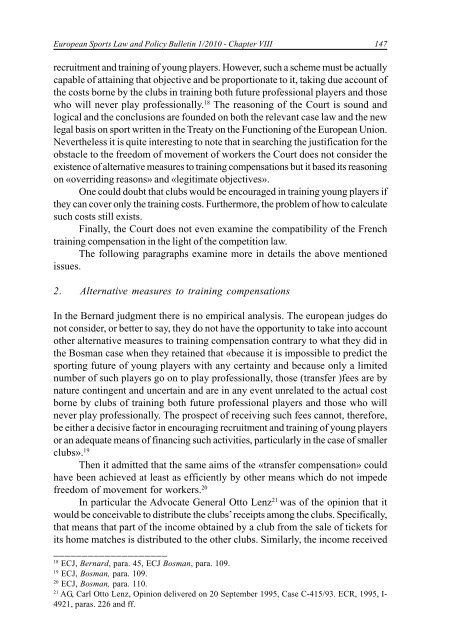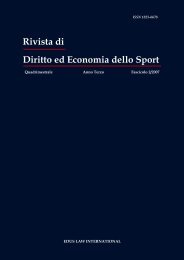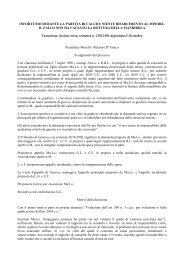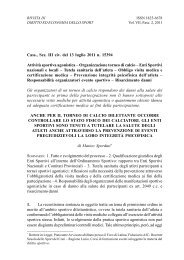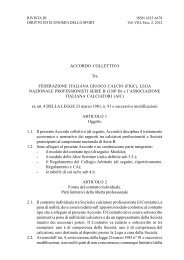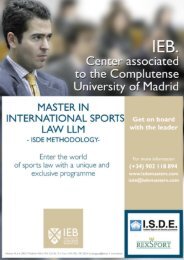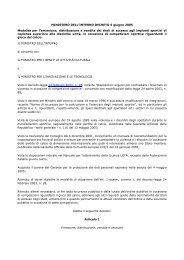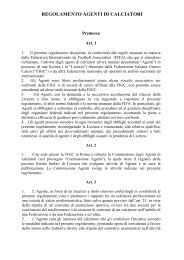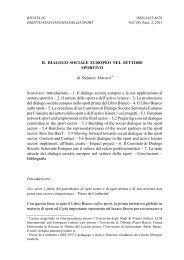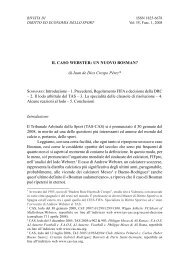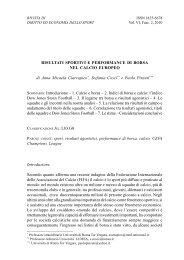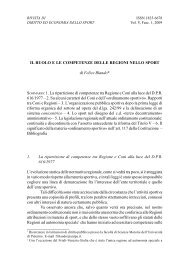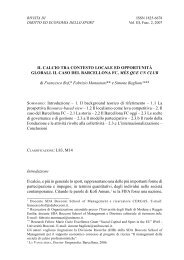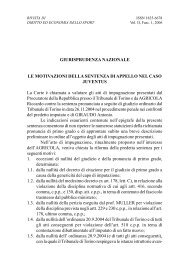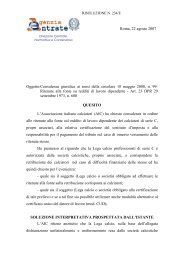European Sports Law and Policy Bulletin THE BERNARD ... - Slpc.eu
European Sports Law and Policy Bulletin THE BERNARD ... - Slpc.eu
European Sports Law and Policy Bulletin THE BERNARD ... - Slpc.eu
Create successful ePaper yourself
Turn your PDF publications into a flip-book with our unique Google optimized e-Paper software.
<strong>European</strong> <strong>Sports</strong> <strong>Law</strong> <strong>and</strong> <strong>Policy</strong> <strong>Bulletin</strong> 1/2010 - Chapter VIII 147recruitment <strong>and</strong> training of young players. However, such a scheme must be actuallycapable of attaining that objective <strong>and</strong> be proportionate to it, taking due account ofthe costs borne by the clubs in training both future professional players <strong>and</strong> thosewho will never play professionally. 18 The reasoning of the Court is sound <strong>and</strong>logical <strong>and</strong> the conclusions are founded on both the relevant case law <strong>and</strong> the newlegal basis on sport written in the Treaty on the Functioning of the <strong>European</strong> Union.Nevertheless it is quite interesting to note that in searching the justification for theobstacle to the freedom of movement of workers the Court does not consider theexistence of alternative measures to training compensations but it based its reasoningon «overriding reasons» <strong>and</strong> «legitimate objectives».One could doubt that clubs would be encouraged in training young players ifthey can cover only the training costs. Furthermore, the problem of how to calculatesuch costs still exists.Finally, the Court does not even examine the compatibility of the Frenchtraining compensation in the light of the competition law.The following paragraphs examine more in details the above mentionedissues.2. Alternative measures to training compensationsIn the Bernard judgment there is no empirical analysis. The <strong>eu</strong>ropean judges donot consider, or better to say, they do not have the opportunity to take into accountother alternative measures to training compensation contrary to what they did inthe Bosman case when they retained that «because it is impossible to predict thesporting future of young players with any certainty <strong>and</strong> because only a limitednumber of such players go on to play professionally, those (transfer )fees are bynature contingent <strong>and</strong> uncertain <strong>and</strong> are in any event unrelated to the actual costborne by clubs of training both future professional players <strong>and</strong> those who willnever play professionally. The prospect of receiving such fees cannot, therefore,be either a decisive factor in encouraging recruitment <strong>and</strong> training of young playersor an adequate means of financing such activities, particularly in the case of smallerclubs». 19Then it admitted that the same aims of the «transfer compensation» couldhave been achieved at least as efficiently by other means which do not impedefreedom of movement for workers. 20In particular the Advocate General Otto Lenz 21 was of the opinion that itwould be conceivable to distribute the clubs’ receipts among the clubs. Specifically,that means that part of the income obtained by a club from the sale of tickets forits home matches is distributed to the other clubs. Similarly, the income received____________________18ECJ, Bernard, para. 45, ECJ Bosman, para. 109.19ECJ, Bosman, para. 109.20ECJ, Bosman, para. 110.21AG, Carl Otto Lenz, Opinion delivered on 20 September 1995, Case C-415/93. ECR, 1995, I-4921, paras. 226 <strong>and</strong> ff.


